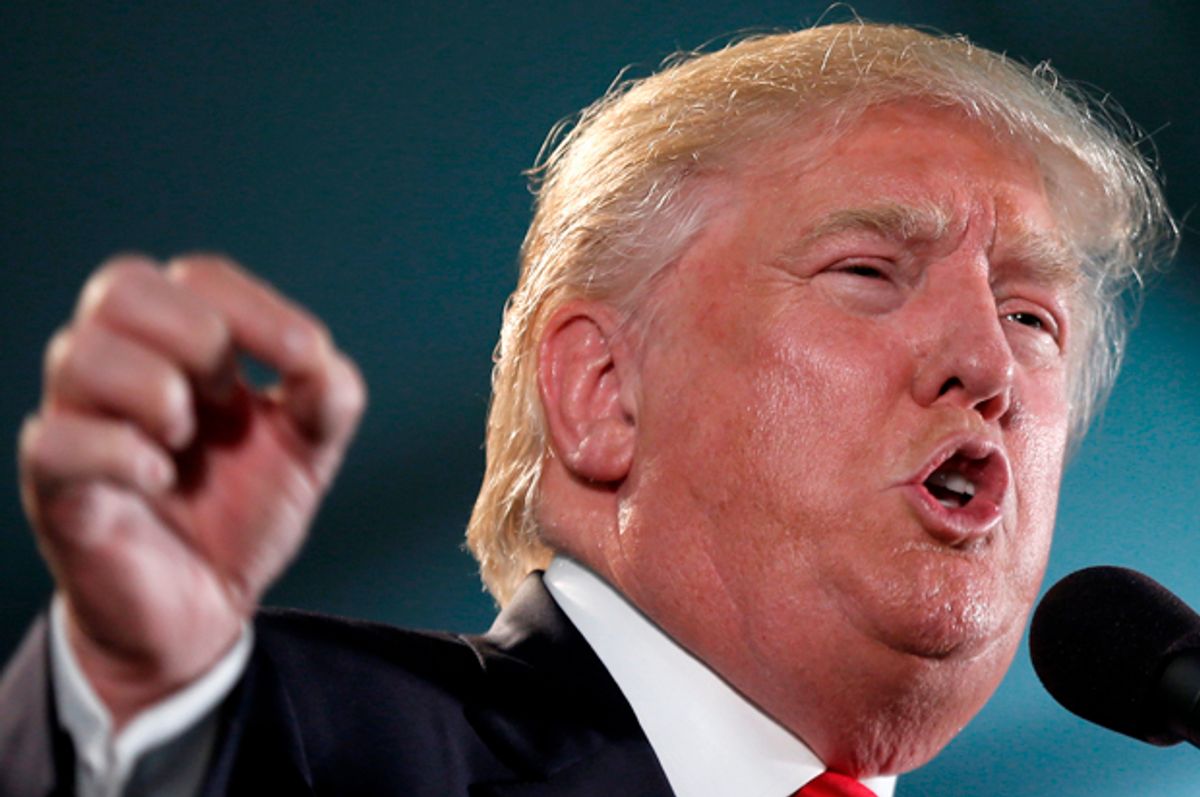This piece originally appeared on BillMoyers.com.
Two recent polls demonstrate that support for Donald Trump in the military and among veterans outpaces support for both Hillary Clinton and Bernie Sanders. A May Military Times survey of active-duty troops showed Trump beating Clinton by better than a 2-to-1 margin. A Morning Consult poll of veterans and active-duty members taken later the same month showed the likely Republican nominee leading his Democratic rival by nine percentage points.
People ask me on a regular basis why so many veterans support Trump. First, we must consider that the military personnel in general seem to skew a bit to the right. If we have more Republicans in the military — through self-selection or geographically targeted recruiting in the South — it stands to reason to have more military personnel support for the Republican nominee.
Even so, the support for Trump does seem hard to fathom. This is, after all, a man whose only experience of the military came in a New York military academy where his father hoped he’d learn to control his bad behavior. Trump avoided service in the Vietnam war with four student deferments and during the campaign mocked the nation’s most celebrated POW, Sen. John McCain (R-AZ).
We must remember that veterans are not very different from civilians. We carry the same fears, hopes and anger as the rest of the country. This election cycle has been exceptionally volatile. The perceived outsider status of Trump and Sanders has brought new people into the political process and fired up the base of both major parties. Trump has masterfully used the media and large crowds to create a spectacle to build support. He has featured veterans in his stage show, using them as props to gain credibility and making us more visible in the process.
I’ve also been asked whether Trump is filling a leadership vacuum for veterans and active-duty personnel. While veterans are very much like the rest of the electorate, concerned and upset about the same issues as everyone else, there are also differences. We are the other 1 percent — the 1 percent that takes on the burden of fighting in war. For us, 22 suicides a day is not just a statistic — it’s a reality. We miss our families, and we suffer from traumatic brain injury, post-traumatic stress disorder and broken bodies. We see and hear about our friends dying on the battlefield, and we are tired of fighting. Veterans, families and active-duty personnel suffer in ways unknown, misunderstood or ignored by most Americans.
The United States has been consistently at war for at least 25 years, since the start of the so-called First Gulf War. We never stopped military operations in the region, and there has been no clear victory or end in sight. This time period has seen two Republican and two Democratic presidents. Neither party has brought real answers or leadership to end the wars and bring our troops home. Little wonder that in the current surveys both the perceived outsiders, Sanders and Trump, do better than the establishment candidate Clinton. People including veterans want answers to problems. Clinton is perceived as more of the same.
So, yes, there is a leadership vacuum. It is the same global leadership vacuum that has led to an increase in right-wing movements and the rise of hate around the world. It is the same vacuum that has allowed such an extreme concentration of wealth that — according to a 2015 Oxfam report — the top 1 percent will own more than the rest of us combined, leaving billions of people to fight over what the rich have not managed to take.
The bottom line is that veterans who support Trump support him for the same reasons civilians d0. Millions believe that he, like Sanders, is an outsider who can shake up the system and solve problems. I understand feeling this way. I am also angry with the lack of progress on solving the nation’s problems — including endless war — and disregard for poor and working class people in the country and around the globe. But those are not the only issues that concern me. In January, I helped Veterans For Peace launch Veterans Challenge Islamophobia. The purpose of the campaign is to push back on the most recent wave of anti-Muslim speech and actions that are sweeping the country after the Paris and San Bernardino attacks late last year and rising in the aftermath of the horrible mass shooting in Orlando.
As veterans who have been told we served to protect the U.S. Constitution and Bill of Rights, we are outraged at the targeting of people because of their religious affiliation, and we call on all political leaders to disavow all forms of hate speech and bigoted public-policy proposals. Further, as has been said by many security experts, anti-Muslim rhetoric and polices like banning Muslims from entering the country will give ISIL a recruiting tool. Calling the attacks “radical Islamism” are not helpful in confronting hate and creating an atmosphere of unity.
Asking why veterans support Trump is a legitimate question. But the most important question is how do we meet the economic, social and security challenges before us in a way that addresses the needs of poor, working-class and average people. Failure to address these issues is why Trump has any support at all.

Shares